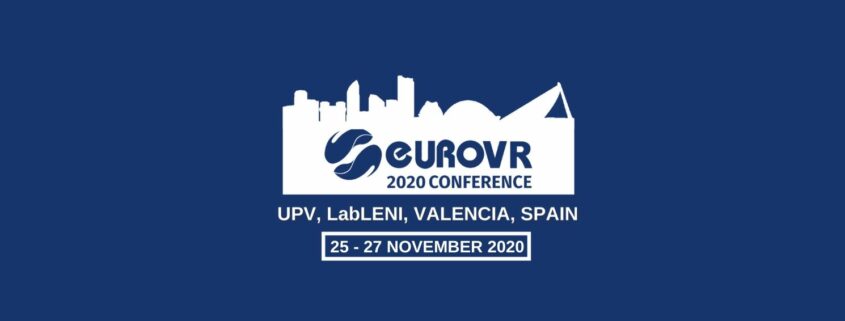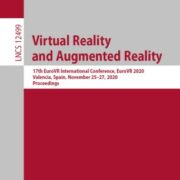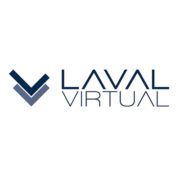EuroVR 2020 Conference: 1st Call for Contributions
We are pleased to announce the 17th EuroVR International Conference – EuroVR 2020 – planned on 25-27 November 2020 in Valencia, Spain. This conference follows a series of successful European VR/AR conferences taking place since 2004. The Immersive Neurotechnologies Lab (LabLENI) of the Polytechnic University of Valencia (UPV), Spain, is organizing the 2020 edition of this conference.
The 17th EuroVR International Conference opens the 1st call for contributions.
1) Scientific track submissions can be:
- Full papers – either Long (14-20 pages) or Medium (8-12 pages) sizing – to be presented respectively as long or short talks during the scientific talk sessions: such submissions target original, unpublished papers documenting new research contributions, practices and experience, novel applications in VR or AV/AR/MR, or sound States of the Arts on challenging research questions in that field.
- Short papers (4-6 pages) to be presented during the scientific poster sessions: such submissions targets work in progress or other scientific contributions including ideas for unimplemented and/or unusual VR or AV/AR/MR systems. All scientific paper submissions are in the one column Springer format, and indicated paper lengths do not include references.
The Scientific Program chairs will be in charge to select the accepted contributions of the both above categories, thanks to a double blind peer reviewing process among an International Program Committee (IPC). All accepted scientific papers will be published with the sizing (Long/Medium or Short) corresponding to their category in the Scientific proceedings of EuroVR 2020, edited by Springer as a volume of the Lecture Notes in Computer Science (LNCS) series. For your convenience, indexing information of LNCS series is available on this Springer webpage.
2) Application track contributions can be:
- Application talk (2-4 pages abstract): best practices, practical use cases of VR or AV/AR/MR, project results of applications using such technologies in industry and other sectors, actual or potential transfers of academic results, and position papers.
- Application poster (2-4 pages abstract): recently completed VR or AV/AR/MR applied work, application in progress, or unusual applications.
For this track, the Application Program chairs will manage the full review/acceptation process of two types of contributions (Application talk vs. Application poster).
3) Demo & Exhibition track (2-4 pages abstract): live demonstrations of past and on-going projects. Technology developers and suppliers, exhibitors, digital artists, and members of the commercial VR or AV/AR/MR communities are all invited to exhibit and demonstrate the latest technologies and applications.
For this track, the Demo & Exhibition chairs will manage the full review/acceptation process of this type of contributions. Moreover, we highly encourage all authors submitting any kind of contribution to categories 1.a, 1.b, 2.a or 2.b, to also submit a live demonstration and so a related abstract to this Demo & Exhibition track.
All accepted abstracts for Application track and Demo & Exhibition track will be published in the Application proceedings of EuroVR 2020 as an ISBN-registered volume edited by VTT Technical Research Centre of Finland Ltd.
Application talk (1 page abstract): best practices, practical use cases of VR or AV/AR/MR, project results of applications using such technologies in industry and other sectors, as well as actual or potential transfers of academic results.
JOURNAL INVITATION AND AWARDS
In addition, a set of the best accepted contributions will be selected by a special committee structured according to the categories of the Scientific and Application tracks, to invite the authors of the selected contributions to submit an extended version to the open access journal Frontiers in Virtual Environments.
Last but not the least, based of the work of the same special committee, best awards will be decided for each contribution category within each track. More information on the EuroVR best awards procedure will be available soon on the EuroVR 2020 website, as well as the winners of previous years.
SUBMISSION GUIDELINES
For all categories of the Scientific track, double blind peer reviewing process will be applied, and submissions have to be uploaded thanks to the Online Conference Service (OCS) of Springer.
Information on the OCS page will appear soon in the detailed submission guidelines of this track: eurovr2020.eu
For all categories of the Application track and for Demo & Exhibition track, submissions have to be uploaded thanks to EasyChair. Information will be available soon in the conference page: eurovr2020.eu
TOPICS OF INTEREST (include, but are not limited to)
Human factors issues
● User studies on all issues related to VR or AR/AV/MR
● Presence, realism, validity and fidelity
● 3D user interfaces and/or 3D interaction metaphors
● Self-representation and embodiment, avatars, virtual humans
● Cybersickness and side effects
● Cost effectiveness and cost efficiency
● Ethical procedures and guidelines
Technologies
● Virtual reality system architecture
● Collaborative and distributed VR or AV/AR/MR
● Augmented reality and mobile devices
● Augmented virtuality and tangible interfaces
● Mixed Reality
● Tracking and motion technologies
● Advances in display technologies
● Image-based 3D modeling and rendering
● Realistic rendering of dynamic or complex scenes
● 3D audio rendering and related technologies
● Haptics and force-feedback, algorithms, systems, and devices
● Real-time modeling & simulation
● Multimodal interaction in immersive environments
● Immersive collaboration: technologies, use cases, management
● Immersive analytics: interactions, models, architectures
● Artificial Intelligence for VR or AV/AR/MR
● Virtual humans for VR or AV/AR/MR
Applications
● Industrial applications
● Aerospace and Transport
● Construction and Architecture
● Manufacturing and Engineering
● Consumer neuroscience
● Organizational neuroscience
● Medical and Rehabilitation
● Product and Process design
● Robotics
● Training and Education
● Cultural heritage and other applications for culture
● Serious Gaming and Edutainment
DEADLINES
For the Scientific track, contributions deadlines are:
- Full Paper submissions (Scientific talks): July 5, 2020 – Short Paper submissions (Scientific posters): July 12, 2020 – Notifications to the authors for all Scientific submissions: August 2, 2020 – Camera ready for all Scientific contributions: August 30, 2020
For the Application track and the Demo & Exhibition track, contributions deadlines are:
- Short abstract submissions for all related categories: Aug 7, 2020 – Notification to authors for all related categories: Sept 4, 2020 – Camera ready for all related categories: Sept 11, 2020
COVID-19 CONTINGENCY PLAN
In case a physical attendance of the conference will not be feasible (due to Covid-19), we will publish all accepted papers as stated above, and we will hold a virtual conference that will allow all authors to present their work.







